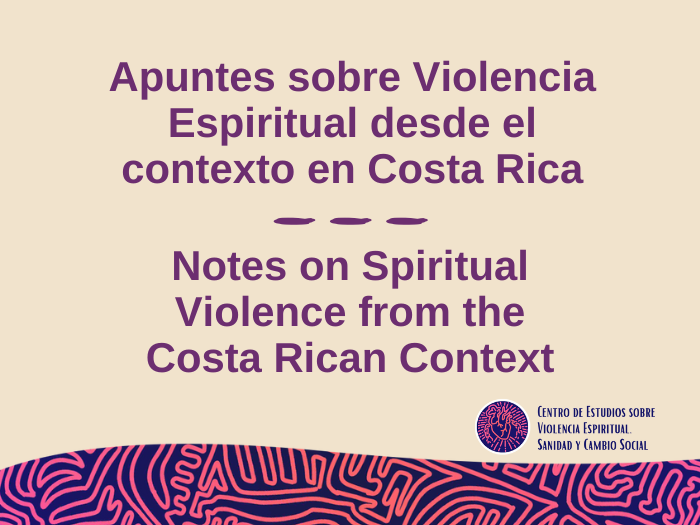
Click here to read this blog in English
Apuntes sobre Violencia Espiritual desde el contexto en Costa Rica
Sharo Rosales es gestora en desarrollo organizacional, comunicadora, consultora de género y activista por los derechos humanos de las mujeres. Actualmente sirve como presidenta de la Junta Directiva de la Universidad Bíblica Latinoamericana
En agosto de 2022, publicamos el libro “Violencia Espiritual y fenómenos religiosos que abusan de la fe”, con el objetivo de profundizar en las diferentes formas en las que históricamente la fe se ha utilizado como un arma en contra de la dignidad de las personas, y abonar a los procesos de sanidad en América Latina. Este texto fue un trabajo colectivo desde su formación; las autoras Judith Bautista, Alba Onofrio y Karina Vargas dejaron que las ideas fluyeran, combinando su experiencia profesional con los testimonios y la retroalimentación que activistas, teologues, investigadores y sobrevivientes de distintas latitudes compartían con ellas.
Esta visión de colectividad acompañó el proceso de escritura, y sigue haciéndose presente en talleres, conversatorios, cursos y otros espacios de encuentro y diálogo entorno a su contenido. A continuación compartimos las palabras de Sharo Rosales, activista e investigadora costaricense, vertidas en una presentación del libro en el Departamento Ecuménico de Investigaciones de San José, Costa Rica, el día 27 de septiembre de 2022. ¡Esperamos que sus agudas reflexiones sigan nutriendo a las conversaciones acerca del tema y fortalezcan nuevos procesos de sanidad y resistencia!
Agradezco mucho haber sido invitada a comentar una obra que además resulta tan particularmente interesante. El título “Violencia Espiritual y fenómenos religiosos que abusan de la fe”, es capaz de adelantar y describir lo que en sus páginas aguarda: el nombre de muchas prácticas, unas soterradas y otras explícitas, que persisten en grupos religiosos, en nombre del amor, la obediencia y una supuesta voluntad de Dios para las personas oprimidas y violentadas. Pero además describe como se establecen conexiones entre estas prácticas abusivas, para lograr sostenerse en el tiempo, a pesar del dolor que acarrean y lo contradictorias que resultan ser.
Este es un escrito de lectura ineludible; que atrapa a quien lee gracias a su cercanía. Casi todas las personas conocemos a alguien que fue abusada, disminuida, manipulada o saqueada desde emocional hasta económicamente, dentro de un grupo religioso. Este es un texto espejea nuestra propia historia cultural e individual, porque da voz a nuestra herida secreta, a nuestro dolor, mismo que, se suele llevar en soledad, con una buena dosis de culpa, con mucha confusión, vergüenza, y un gran sentimiento de inadecuación social.
El Abuso Religioso se gesta desde mucho antes de sufrirlo, porque en el fondo de nuestras interpretaciones está nuestra herencia familiar y cultural susurrando al oído aquello que aprendimos como cierto e indiscutible: no se tiene derecho a cuestionar la autoridad, no es de buenas costumbre contradecir o decir un no, mucho menos desafiarla aunque ésta actúe arbitrariamente, sin respeto a límite alguno y sin rendir cuentas a nadie. “Toda autoridad viene de Dios, y las que existen por él han sido establecidas”, nos recuerdan los ungidos con esa vocecita hipócrita, citando Romanos 13 para justificar en nombre de lo divino el poder y el control que ejercen. En palabras de las autoras: “curas, sacerdotes, pastores, presidentes, dictadores, diputados o candidatos políticos, son elevados a una condición similar a la de una semideidad, con atribuciones casi sobrenaturales y de privilegio que este nombramiento les concede que los hace intocables e incuestionables”.
Y así en Costa Rica y en toda la región son cientos los casos de ultrajes no denunciados y cientos los depredadores sexuales y delincuentes religiosos sueltos, que gozan de impunidad. ¡Dichosamente, la cosa está cambiando! Ejemplo de ello es la condena que recientemente recibió Carlos Manuel Chavarría Fonseca, conocido como “el pastor de los ricos”, por abusos sexuales a mujeres y niñas miembros de su iglesia.
Este libro es una obra sobre violencia simbólica y sobre colonización de territorios, pero también de psiquis y cuerpos, sobre históricas confabulaciones perversas, sobre temas que no se hablan para evitar conflictos y abusos que se perpetúan. Es un texto que combina el compromiso investigativo y sentido crítico con una profunda empatía y amor para con las personas que han sido víctimas de estos abusos religiosos, y es también un semillero de sospechas, una guía para armar un rompecabezas y una esperanza para sanar individual y colectivamente. De su lectura se desprende que estas formas de violencia religiosa no son al azar, no están desarticuladas y que no responden al actuar de alguien que se equivocó, en su afán de hacer las cosas bien, sino que responde a estrategias orquestadas para mantener vivos ciertos privilegios.
Los diferentes capítulos se amarran unos a otros , desarrollando conceptos y trenzándolos con experiencias, vivencias, e inclusión de casos reales y propuestas. Donde cada caso podía haber sido o ser el tuyo o el mío o el Nuestro… Los ejercicios propuestos al final de cada capítulo dentro de las secciones de “Conecta con tu cuerpo” y “Preguntas para dialogar” son muy hermosos: sencillos, accesibles, bien descritos, con una guianza y objetivo claro. Imagino los grupos compartiendo experiencias, dándole sentido a muchas dudas y recelos, les imagino con lágrimas… de dolor, pero también de sanidad y también los imagino, llenándose valor, empatía y amor liberador.
Gracias a las autoras Judith Bautista, Alba Onofrio y Karina Vargas por este maravilloso libro, por el tiempo invertido, por la energía y por la valentía. Puedo imaginar a las personas después de leerlo, compartiéndolo con otras personas en su casas y siguiendo con el tema mientras toman café. Cito textualmente: “Reconocemos que sanar es vivir. Levantarnos cada mañana con ganas de recrear la vida, la nuestra y la de otres y crear, incluso desde las cenizas, esa persona que deseamos ser”.
Notes on Spiritual Violence from the Costa Rican Context
Note to the Reader: this blog was originally written in Spanish; therefore, all cultural or social references are subject to the authors’ context.
Sharo Rosales is an organizational development manager, communicator, gender consultant and women’s rights activist. She currently serves as President of the Board of Directors at the Universidad Bíblica Latinoamericana.
In August 2022, we published the book “Spiritual Violence and Religious Phenomena That Abuse Faith”, with the aim of delving into the different ways in which faith has historically been weaponized against various groups of people while also nurturing healing processes in Latin America. This text has always been a collective work. From its beginning, the authors Judith Bautista, Alba Onofrio and Karina Vargas let the ideas flow, combining their professional experience with the testimonies and feedback that activists, theologians, researchers, and survivors from around the continent shared with them.
This collective vision found its way throughout the writing process, and continues to be present in workshops, conversations, courses, and other spaces created to discuss its content. Below, we share the words of Sharo Rosales, a Costa Rican activist, researcher, and feminist theologian, delivered at a book presentation at the Ecumenical Research Department (DEI) in San José, Costa Rica, on September 27th, 2022. We hope that her insightful reflections continue to fuel conversations on the subject and strengthen new processes of healing and resistance!
I’m very grateful for having been invited to speak about such an interesting work. The title alone, “Spiritual Violence and Religious Phenomena that Abuse Faith”, is capable of providing a sneak peek into what awaits inside its pages: the name of many practices, some covert and some explicit, that persist among religious groups in the name of love, obedience, and God’s supposed will for oppressed and violated people. It also describes how connections are established between these abusive practices in order to perpetuate themselves, despite the pain they bring and how contradictory they always turn out to be.
This is a must-read book that engages its readers with its relatability. Almost all of us know someone that was abused, diminished or manipulated, in the emotional and/or economical senses, inside of a religious group. This is a text that mirrors our own cultural and individual stories because it gives voice to our secret wounds, to our pain; a pain that is usually carried in solitude with a good dose of guilt, a lot of confusion and shame, and a great feeling of social inadequacy.
Religious abuse brews long before someone falls victim to it, because at the core of our interpretations lay our cultural and family heritages, whispering in our ears that which we have learned as true and indisputable. One does not have the right to question authority, it’s not a good practice to contradict it or say no, even less so to challenge it even when it acts arbitrarily, with no respect for boundaries and with no accountability to anyone. “For there is no power but of God: the powers that be are ordained of God”, the anointed remind us with a hypocritical voice, citing Romans 13:1 to justify in the name of the divinity the power and control they wield. In the words of the authors: “priests, pastors, presidents, dictators, congressmen, and political candidates are elevated to a state similar to that of a semi-deity, with almost supernatural attributes and privileges conceded to them by their title, that make them untouchable and unquestionable”.
And so, in Costa Rica and throughout the whole region, there are hundreds of unreported cases of abuse and hundreds of sexual predators and religious criminals on the loose, enjoying impunity. Fortunately, things are changing. An example of this occurred recently in Costa Rica, with the sentencing of Carlos Manuel Chavarría Fonseca, better known as “The Pastor of the Rich”, for the sexual abuse of women and minors that were members of his church.
This book is a work about symbolic violence and colonization, but also about psyches and bodies, about perverse historical conspiracies, about topics that are not talked about to avoid conflict, and about the perpetuation of abuse. It is a text that combines investigative commitment and critical sense with profound empathy and love for the people that have fallen victim to religious abuse. It is also a hotbed of suspicion, a guide for putting together a puzzle, and hope for individual and collective healing. Its reading leads to the understanding that these forms of religious violence are not random, they are not disjointed, and they don’t respond to the actions of individuals that made mistakes while trying to do the right thing; instead, they respond to deliberate strategies, designed to maintain certain privileges alive.
All the chapters are tied to one another, developing concepts and linking them with real-life experiences, where each case could have been (or has been) yours, mine, or ours. The exercises included at the end of each chapter, in the sections titled “Connect with your body” and “Questions for dialogue”, are beautiful, simple, accessible, well-described, with clear guidelines and objectives. I imagine groups sharing experiences and making sense of many doubts and misgivings. I imagine them with tears in their eyes, of pain but also of healing. And I imagine them filling themselves with courage, empathy, and liberating love.
Thanks to the authors, Judith Bautista, Alba Onofrio, and Karina Vargas, for this wonderful book, for the time invested in it, for their energy, and for their bravery. I can imagine people after reading it, sharing it with other people, and carrying conversations about the contents over coffee. Citing the book: “We recognize that to heal is to live. Waking up every morning with the will to re-create life, ours and that of others, and to create, even from the ashes, the person that we want to be”.


